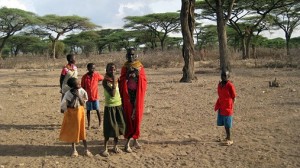A BLOG POST BY WENCHI YU, who serves in the Secretary's Office of Global Women's Issues. Since 2008, the drought-induced food crisis that affected many countries in the Horn of Africa not only cost the regional economy billions of dollars, but also exacerbated regional instability, insecurity in distressed communities, and tribal competition for scarce resources.
Since 2008, the drought-induced food crisis that affected many countries in the Horn of Africa not only cost the regional economy billions of dollars, but also exacerbated regional instability, insecurity in distressed communities, and tribal competition for scarce resources.
Josephine Ekiru, a 26-year-old conservationist from the Turkana tribe near Shaba in Kenya, was determined to do something for her community after witnessing the devastating impact of frequent conflict on both the region's people and wildlife. She started by talking to the women in her community, hearing about their common concern of losing husbands and sons in the conflicts. She also reached out to women of the other major tribe, the Borana, with which the Turkanas were in conflict. After years of work, she gained trust from both groups. In May 2010, Josephine's work helped unite the two tribes to form a conservancy, a community-based conservation initiative, as part of a quiet movement in Northern Kenya, where over 100,000 people have dedicated their land, 3 million acres in total, to wildlife conservation. Josephine played a key leadership role in this effort and was elected as the chair of the Nakuprat-Gotu Conservancy, which now includes thousands of people living in Gotu and Ngare Mara locations of Isiolo County. This conservancy initiative brings together the Borana and Turkana tribes who have been in constant conflict in the past mainly due to mistrust, cattle raiding, and competition for pasture.
On a recent joint USAID-State Department, gender-assessment trip as part of the U.S. government's response to droughts in the Horn of Africa, I had the honor of meeting Josephine. She told us how she had built sustainable peace and wildlife conservation through this community-led approach. Even though the region is known as a hub for poaching, conservancy-led awareness education efforts have helped poachers from within the region realize the economic benefits of conservation. As a result, many former poachers are now part of the conservancy security team helping to protect the wildlife. Through building the conservancy initiative, Josephine has also been able to talk about sensitive issues such as child marriage. According to Josephine, adolescent girls are expected to be married between the ages of 12 and 17; she was married at 16. But now, there's an increasing awareness that delaying young girls' marriage is good because people like Josephine can do more for the communities if they stay in school and receive higher education.
Men from Josephine's community came to listen while we discussed her work. When asked how they feel about the conservancy model and Josephine, they expressed support and pride in her leadership. Josephine added that her work has helped her gain confidence and courage despite death threats in early days. Her approach exemplifies the community-driven solution to promoting sustainable development, conflict resolution, and women's empowerment. Josephine's story also reaffirms the benefits of involving women in the peace building process and investing in women for effective development.
